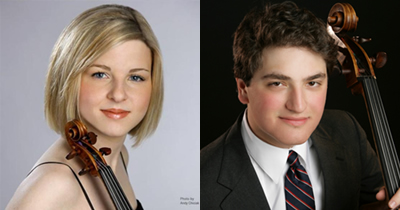The final concert of the Eastern Music Festival’s 50th anniversary season was a celebration for several departing faculty, a commissioned world premiere and two twentieth-century masterpieces, plus a stunning demonstration that young players will continue to make their mark as great and celebrated soloists.
Gerard Schwarz, Music Director, was on the podium for a very personal evening that included his son performing alongside him and the world premiere of Dust Devils, a work commissioned by the festival, Mr. Schwarz and Jeanne Tannenbaum, in memory of Sheldon Morgenstern, founder of EMF. Composed by Juilliard graduate and New York-based composer Vivian Fung, who was present in the audience, Dust Devils is an atmospheric and evocative work that showcases the composer’s capacity to employ non-Western influences within the confines of a traditional orchestra. Fung provides a very brief description of the work as if to not totally intrude on or influence the listener’s own impressions. The work vacillates from placid, peaceful moments to bombastic outcries: perhaps an apt description of the ups and downs of the numerous complex facets of running a successful music festival for fifty years.
The suspicious cynic might look at tonight’s program along with the artist bios, read that cello soloist Julian Schwarz is the twenty-year-old son of Gerard Schwarz and whisper thoughts like “aha! Nepotism; I wonder how he got that gig?” Well, all it took was the masterful, powerful playing of the cello’s opening of Brahms’ Concerto for Violin and Violoncello in A minor to realize that you were in the presence of a mature and stellar musician who is destined for a remarkable career. Combine Mr. Schwarz, the younger, with violinist Caroline Goulding, first prize winner of the Aspen Music Festival’s Concerto Competition and already a veteran of countless engagements with orchestras all over the world, and you have a duo where neither can legally buy a drink, but they just may be the equal of any pair of musicians to ever play this monumental and treacherously difficult work. Cellist Schwarz was perched on a platform (not quite as high as his dad’s!) and there was a microphone placed in front of that. Whatever amplification they used was unobtrusive and natural and the balance between the two soloists and the orchestra was perfect. Goulding plays with such ease and command of the instrument and the music that my only possible negative impression is that at times there seemed to be an attitude of disinterest. The duo matched phrasing, articulation and energy throughout this lengthy work, especially the plaintive andante where it was as if the instruments were joined as one. No one mixes the sacred and profane better than Brahms, and the rousing and exuberant dance-like finale was in stark contrast to what came before. These young artists dispelled the oft-repeated misconception that many young players are all technique without the maturity and depth to play great music.
The second half consisted of two very different suites from two ballets by two of the towering twentieth-century composers: Béla Bartók and Igor Stravinsky. One does not generally think of Bartók as a programmatic composer, yet his suite of music for the 1926 one-act ballet The Miraculous Mandarin closely parallels the violent and disturbing storyline of the ballet. No time is wasted at the outset as the strings erupt into a busy, loud, angry and disjointed exposition that only increases in intensity until you physically feel a sigh of relief as it finally dissipates. This is virtuosic orchestral playing to the max, and thus it is no surprise why it is rarely programmed. In fact, this may be more aptly called “Concerto for Orchestra” rather than the actual work of that name by Bartók. There are brief sections of repose, but for the most part your nerves are jangled and you almost feel psychologically scarred.
The Bartók is in direct contrast to Stravinsky’s suite from The Firebird. Written in 1910 for the Ballet Russes and premiered in Paris, both the ballet and the music was a resounding success. Stravinsky re-orchestrated a suite in 1919 and this is the version we heard tonight and is most often performed. Based on a Russian fairy tale, for the most part the music is serene and lyrical, although there are several dance episodes that are loud and aggressive. This requires a different although no less important or difficult musical touch than the Bartók, and both Schwarz and the orchestra were masterful as they spun a web of great delicacy and mystery through much of the work. Dynamics play as much a part here as the notes played and this was especially evident in the long, slow and beautifully paced build-up in the finale.











